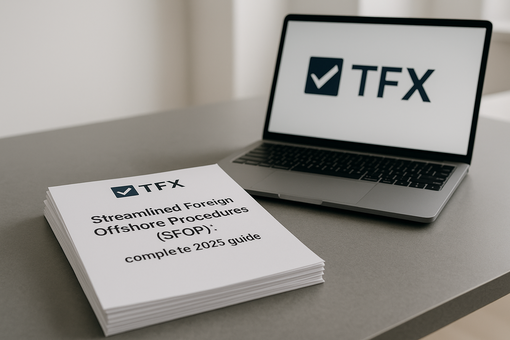Green card foreign income tax guide (2026): What to file & forms

If you're a green card holder living outside the United States, your tax obligations don’t stop when you move abroad. Even while earning income overseas, the IRS still considers you a US taxpayer.
For example, when filing in 2026, you'll report income earned in 2025, just as if you were still in the United States. Understanding which income is taxed, which forms to file, and which exclusions or credits you may qualify for is essential for staying compliant with green card foreign income tax.
Taxes for Expats (TFX) helps Americans abroad manage their tax obligations and file correctly, ensuring compliance with US tax law – learn more about our services or contact us.
Key takeaways – facts that matter
Below are the core facts for permanent resident taxes in 2025 and 2026. Figures and forms reflect official guidance for quick reference.
- Income: For green card taxes, resident aliens are taxed on worldwide income – same rules as citizens.
- Relief: The Foreign Earned Income Exclusion (FEIE) is $130,000 for 2025 and $132,900 for tax years beginning in 2026. It is claimed on Form 2555. The Foreign Tax Credit (FTC) is claimed on Form 1116 for foreign income you do not exclude.
-
Reporting: FBAR filing is required if foreign accounts exceed $10,000 at any time.
FATCA/Form 8938 applies when specified foreign assets exceed $200,000/$300,000 (single abroad) or $400,000/$600,000 (MFJ abroad). - Deadlines: Living abroad grants an automatic 2-month filing extension to June 15; request Form 4868 for additional time until Oct 15.
For complete 2026 inflation adjustments, see IRS announces 2026 tax brackets & inflation adjustments and IRS Revenue Procedure 2025-32.
Do green card holders have to pay taxes on foreign income?
Yes. Green card holders, legally called lawful permanent residents, are taxed like US citizens, which means they must report all income, no matter where it comes from.
What changes when you move abroad or adjust your status:
- You move abroad but keep your green card – You remain a US tax resident and must file Form 1040. Understanding green card holder tax on foreign income is essential – FEIE and FTC become your primary tools to reduce double taxation.
- Your plastic card expires – Immigration status continues until formally terminated; you still file as a resident.
- You abandon your green card (file Form I-407) – Tax residency ends on the date USCIS accepts your I-407 or a court/agency terminates status. File a final resident return for the portion of the year you were an LPR, then switch to Form 1040-NR if you remain in the US or have US-source income.
-
You claim treaty tie-breaker to become a nonresident – If a tax treaty classifies you as a resident of another country, you may file Form 1040-NR with Form 8833 to end your TAX residency. Important: This does NOT end your green card for immigration purposes – you remain an LPR until you file Form I-407. Treaty tie-breakers end tax obligations but not immigration status.
Reducing double tax for green card holders
There are four tools to keep green card foreign income tax under control when you're living and working abroad: the foreign tax credit (FTC), the foreign earned income exclusion (FEIE), the foreign housing exclusion, and tax treaties.
Your choice between FTC and FEIE often depends on income type – earned income (wages, self-employment) can be excluded via FEIE, while passive income (dividends, interest, capital gains) cannot. The housing exclusion works only if you've qualified for FEIE. Below, we outline how each works in tax year 2025 – and when to combine them for the strongest defense against double taxation.
Tool Best for Main eligibility Doesn’t cover Forms FEIE Mostly wages/SE abroad; low–mid foreign tax Tax home abroad + PPT or BFR Passive income; FBAR/8938; can be sub-optimal in high-tax countries 2555 Housing High rent/utilities abroad (add-on to FEIE mechanics) Same framework as FEIE + qualified housing costs + caps/locality limits Home purchase costs; non-housing living costs; still need reporting 2555 FTC High-tax countries; mixed income types Creditable foreign income tax + foreign-source income Doesn’t help if little/no foreign tax; limitation rules/baskets; no FTC on FEIE-excluded income 1116 (often) Treaty Residency conflict / specific treaty articles Eligible under treaty; tie-breaker facts; disclosure may be required Not automatic; saving clause limits many benefits; doesn’t replace FBAR/8938 8833 (+ return position) Foreign tax credit (FTC)
The FTC is a dollar-for-dollar credit for income taxes paid to a foreign country, generally claimed on Form 1116.
Example: You earn $100,000 in Germany and pay €20,000 (≈ $22,000) in German income tax. Your US tax on that income is $18,000. You claim an $18,000 FTC on Form 1116, zeroing out your US liability on that income, and carry forward the remaining $4,000 credit to future years.
Common mistake: Claiming FTC on income you've already excluded via FEIE. If you exclude $130,000 under FEIE, you cannot also claim a foreign tax credit on that same income. Use FTC only on income you did not exclude, or choose one method for all your earned income and stick with it for the year.
Requirements to benefit from FTC:
- The foreign levy is an income or profits tax, legal and compulsory.
- You are the taxpayer on whom the foreign tax is imposed.
- The income is foreign-source and also taxed by the US.
- You file Form 1116, separating categories and countries as required.
- The credit is limited to US tax on that same income; excess may be carried back 1 year and forward 10 years.
FEIE (bona fide residence/physical presence tests)
FEIE lets qualifying taxpayers exclude up to $130,000 for 2025 ($132,900 for 2026) by filing Form 2555. It applies to wages or self-employment income earned abroad, not to dividends, interest, or capital gains. For example, if you earn $170,000 abroad and qualify, the excluded amount is subtracted first, and the remainder is taxed by the US – foreign tax credits may offset some of that tax.
What counts as foreign earned income:
- Wages and salaries for work performed abroad
- Self-employment income earned while physically outside the US
- Bonuses, commissions, and professional fees tied to foreign services
What does NOT count:
- Dividends, interest, capital gains, and rental income
- Pensions and Social Security benefits
- Income for services performed in the US, even if paid by a foreign employer
Bona fide residence test: You establish that a foreign country is your home for an uninterrupted period that includes a full calendar year. Facts and circumstances matter – ties like housing, family, and intent are weighed.
Physical presence test: Spend at least 330 full days in foreign countries during any 12-month period; the days need not be consecutive. This test is mechanical and available to resident aliens regardless of treaty nationality.
Who shouldn't use FEIE:
- Earners in high-tax countries where the FTC exceeds the value of exclusion
- Those with primarily passive income (FEIE doesn't apply)
- Self-employed individuals who want to preserve Social Security credits (FEIE reduces the income tax on your earnings, but doesn't eliminate self-employment tax – you still owe SE tax unless a totalization agreement applies)
Choose FEIE when:
- You're in a low- or zero-tax country and want to eliminate US tax on earned income
- You meet the 330-day test or bona fide residence and earn under the cap
- You prefer simplicity and don't have significant foreign tax payments to credit
Excluding foreign income or claiming credits? See which works best for green card holdersRead more
Tax treaties and limitations
Treaties can help reduce US tax on certain income, but the "saving clause" usually limits relief for green card holder worldwide tax. If you claim treaty nonresident status under a tie-breaker, you must file Form 8833 to disclose your position; failing to do so can result in penalties or loss of benefits.
Treaty tie-breakers decide which country treats you as a resident if you are considered a resident of both the US and another country. Common tests consider your permanent home, center of vital interests, habitual abode, or nationality. If the treaty assigns you to the foreign country, you may file as a nonresident on Form 1040-NR, but this does not end your green card. For immigration purposes, you remain an LPR until you formally abandon status via Form I-407.
Foreign housing exclusion (FHE)
FHE complements FEIE by excluding reasonable overseas housing costs when you qualify under FEIE and report the exclusion on Form 2555. Your base housing amount equals 16% of the FEIE, and allowable expenses are generally capped at 30% of the FEIE – which implies a $39,000 general cap for 2025 (and approximately $39,870 for 2026), with higher city-specific limits in IRS guidance. In short, eligible costs above the base and within the local cap reduce taxable income, and employees exclude them while the self-employed deduct.
Use our expat FEIE calculator to track your days abroad and confirm your exclusion eligibility before filing.
Reporting foreign accounts & assets
Green card holders with foreign bank accounts must file specific information reports in addition to their annual return. Certain filings also cover foreign financial assets held directly or through entities when values cross set thresholds.
This section maps the foreign bank and financial reporting you may need, highlights key triggers, and notes the penalties for not reporting foreign accounts.
FBAR – FinCEN Form 114:
File if the aggregate value of foreign financial accounts exceeds $10,000 at any time during the calendar year; due April 15 with an automatic extension to October 15; filed electronically via FinCEN.
FBAR penalties:
Following the Supreme Court's ruling in Bittner v. United States, non-willful FBAR penalties are assessed per report (not per account). The maximum non-willful penalty is $10,000 per year for each annual FBAR not filed or filed incorrectly.
For willful violations, penalties can reach the greater of $100,000 (adjusted for inflation – approximately $149,000 as of 2025) or 50% of the account balance at the time of the violation. Criminal penalties (including fines and up to 5 years imprisonment) may apply in cases of intentional evasion.
FATCA – Form 8938:
For taxpayers living abroad, file when specified assets exceed $200,000 at year-end or $300,000 at any time (single/MFS), or $400,000 at year-end or $600,000 at any time (MFJ). Penalties start at $10,000, rise to $50,000 for continued non-filing after IRS notice, and a 40% accuracy-related penalty can apply to understatements tied to undisclosed assets.
What do I file?
| Form | What it reports | Trigger / threshold | Where filed | Due date | Common mistakes |
|---|---|---|---|---|---|
| Form 1040 | Worldwide income (resident return) | Green card not formally terminated | IRS (e-file / mail) | Apr 15; if living abroad on Apr 15, auto to Jun 15; filing extension can go to Oct 15 | “No US income = no filing”; forgetting FEIE/FTC add-ons; extending filing but not planning payment (interest can still run) |
| Schedule B (Form 1040), Part III | “Yes/No” disclosure re: foreign accounts + foreign trusts | You have foreign accounts/signature authority (and/or meet Schedule B filing rules) | Attached to Form 1040 | Same as 1040 | Leaving Part III blank; checking “No” incorrectly; checking “Yes” but not filing FBAR |
| FinCEN Form 114 (FBAR) | Foreign financial accounts (bank, brokerage, etc.) | Aggregate > $10,000 at any time during the year | FinCEN BSA E-Filing (not attached to 1040) | Apr 15; automatic extension to Oct 15 | Using year-end balance (not max); omitting joint/signatory accounts; assuming Form 8938 “covers it” |
| Form 8938 (FATCA) | “Specified foreign financial assets” (incl. certain accounts + non-account assets) | If living abroad: Single/MFS: >$200k (year-end) or >$300k (any time). MFJ: >$400k (year-end) or >$600k (any time) | Attach to Form 1040 | Same as 1040 | Mixing up FBAR vs 8938; ignoring non-account assets; using the wrong threshold set |
| Form 2555 (FEIE / housing) | Election to exclude qualifying foreign earned income + housing | You qualify under Bona Fide Residence or Physical Presence and choose FEIE | Attach to Form 1040 | Same as 1040 (or via special extension if you haven’t met tests yet) | Treating passive income as “earned”; failing the day-count test; using FEIE when high foreign taxes make FTC a better fit |
| Form 1116 (FTC) | Foreign Tax Credit calculation | You paid/accrued eligible foreign income tax and claim FTC | Attach to Form 1040 | Same as 1040 | Claiming FTC on income excluded by FEIE; wrong income “basket”; forgetting carryover logic |
| Form 4868 | Automatic extension to file Form 1040 | You need more time to file (not to pay) | IRS (e-file / mail) | Request by the regular due date (often Apr 15); if out of the country, you can file/pay by Jun 15 | Thinking it extends payment; forgetting to file extension by the deadline |
| Form 2350 | Special extension to file only if you need time to qualify for FEIE/housing tests | You expect to file Form 2555 but won’t meet the tests by the due date | IRS (paper filing; special process) | File before the return due date | Using 2350 instead of 4868 (wrong use case); assuming it delays tax payment |
| Form 8833 | Treaty-based return position disclosure | You take a treaty-based position; dual-resident treaty claims often require disclosure | Attach to return | Same as the return (incl. extensions) | Taking treaty position without disclosure; filing the wrong return type for the treaty position |
| Form 8854 | Expatriation statement (ended residency as long-term resident) | You ended green card residency and meet expatriation filing requirements | Attach to Form 1040/1040-NR (or file standalone if no return required) | Due with the return (incl. extensions) | Missing it → can trigger “covered expatriate” risk; confusing “expired” with “expatriated” |
Staying current with these rules keeps your green card income tax obligations clear, minimizes risk, and supports clean, confident compliance.
Expired green card and your tax exposure
An expired green card does not end your US filing obligations – only formally ending LPR status does. See the table below for key outcomes:
| Event | Immigration status | US tax residency result | What you must file |
|---|---|---|---|
| Card simply expires | Still an LPR until status is formally ended | You remain a resident for tax purposes | Keep filing as a resident (Form 1040) until status ends |
| Status formally ended (I-407 accepted, USCIS/court termination, or valid treaty claim) | LPR status ended | US tax residency ends on the proper termination date | Final resident return, then Form 1040-NR if needed; additional steps may apply |
Exit tax for long-term residents
If you were an LPR for 8 of the last 15 years, exit-tax rules under section 877A apply. For 2025, covered expatriates meet any of: average annual net income tax over $206,000, net worth $2,000,000, or failure to certify 5-year compliance on Form 8854.
For 2026, the threshold rises to $211,000 and the mark-to-market exclusion to $910,000. Model outcomes carefully — the mark-to-market regime is often the bigger PR tax concern.
Terminating residency counts as:
- Filing Form I-407 to abandon your green card
- Administrative/judicial termination by USCIS or an immigration court
- Claiming a treaty tie-breaker for nonresident tax status (ends TAX residency only; you remain an LPR for immigration until you file Form I-407)
Correct termination date matters:
Your tax residency ends on the date your LPR status is formally terminated – not when you leave the US, stop filing, or let the card expire. File a final Form 1040 as a resident up to the termination date, then switch to Form 1040-NR for any US-source income after that date.
Common pitfalls:
- Assuming an expired card ends tax residency
- Claiming treaty nonresident status without proper documentation (Form 8833, possibly Form 1040-NR)
- Not modeling exit tax exposure before relinquishing status
Steps to properly end residency:
- File Form I-407 to abandon LPR status
- Notify the IRS with Form 8854 to certify 5-year compliance and determine exit-tax liability
- Coordinate elections and credits if reporting green card foreign income

Behind on filings? Here is how to reset your compliance
Falling behind is fixable, and the IRS gives you a clear path back. For non-willful mistakes, Streamlined Filing Compliance Procedures let you file the last 3 years of returns and 6 years of FBARs while minimizing penalties. Under the foreign track, there’s no miscellaneous offshore penalty, whereas the domestic track applies a 5% Title 26 penalty to the highest aggregate balance of covered foreign assets – this highlights the importance of staying compliant with green card taxes abroad.
These programs exist to encourage voluntary cleanup, and the IRS consistently treats timely self-corrections more leniently than issues found first in an exam. If your footprint includes foreign accounts, PFICs, or business interests, get expert help to align permanent resident tax filings with the right certifications (Forms 14653/14654) and disclosures (Form 8938, FinCEN Form 114 at the $10,000 threshold).
OBBBA 2025 – how it touches green card foreign income tax
Congress enacted the One Big Beautiful Bill Act on July 4, 2025, as Public Law 119-21. It does not change how green card holders are taxed on worldwide income, but it adds a new cost to certain money transfers abroad.
New excise tax – rate & start date: OBBBA creates a federal 1% excise tax on “remittance transfers,” starting with transfers made after December 31, 2025.
Interaction with your return: OBBBA does not alter residency rules or the FEIE/FTC framework. Green card holders remain US resident taxpayers; FEIE for 2025 is $130,000 per qualifying person.
NOTE! OBBBA is a transaction tax on specific outbound payments – it doesn’t change the core rules behind green card foreign income tax or create new credits against income tax. Continue planning under existing FEIE/FTC rules and adjust remittance habits to minimize the new 1% where legally permitted.
Need aid from a tax expert who specializes in expats?
Living abroad with a green card comes with tax rules that can feel confusing and high-stakes. Between worldwide income, foreign accounts, and reporting forms, it's easy to miss something that later becomes costly. Staying on top of these requirements takes more than filing – it takes knowing how the rules apply to your life abroad.
That's where Taxes for Expats comes in – we'll help you weigh your reporting duties, and keep you compliant without paying more than you owe.

FAQ
Yes. Relief is available via the Foreign Earned Income Exclusion or the Foreign Tax Credit, depending on your facts.
You risk back taxes, interest, civil penalties (including FBAR penalties for unreported accounts), and potential audits, though streamlined relief may apply if your noncompliance was non-willful.
Unless a totalization agreement assigns social coverage to the foreign country or a specific exemption applies, you have to.
Yes. Green card holders are US tax residents and must file Form 1040, even if they earn nothing in the US. You may owe no tax after FEIE or FTC, but filing is still required.
Yes. An expired plastic card does not end your tax residency. You must continue filing Form 1040 and reporting foreign accounts (FBAR when balances exceed $10,000, Form 8938 when specified assets exceed thresholds) until you formally abandon your green card via Form I-407 or USCIS terminates your status.
File Form I-407 to relinquish your green card, then Form 8854 to certify five years of tax compliance. If you were an LPR for 8 or more of the last 15 years, you may owe an exit tax if you meet any of these tests: net worth of $2 million or more, average annual net income tax of $206,000 or more for 2025 ($211,000 for 2026), or failure to certify five years of compliance. Mark-to-market rules apply to unrealized gains above $890,000 for 2025 ($910,000 for 2026).



